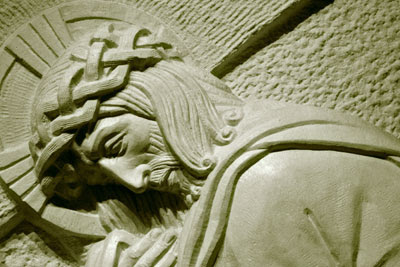 Today is Good Friday. Many around the world are celebrating the anniversary of Jesus' death. This Sunday we remember his resurrection. But I wonder just how many people around the world, and especially the United States, understand the implications of these past events. I am often surprised by the conversations in the media and among Christians concerning the death of Christ.
Today is Good Friday. Many around the world are celebrating the anniversary of Jesus' death. This Sunday we remember his resurrection. But I wonder just how many people around the world, and especially the United States, understand the implications of these past events. I am often surprised by the conversations in the media and among Christians concerning the death of Christ.I remember a conversation I had with a Catholic priest. He seemed to think that Jesus was simply a founder of a new way of thinking about God. That if he died, it was as a revolutionary—a person who was murdered because he loved people. I also read an article by a Protestant minister, who was writing in opposition to the Passion of the Christ movie. He said that some Christians are too focused on blood and the violence Christ endured rather than his teachings about love. He also stated that the gospel has little to do with the death of Christ.
Another troublesome development is the deemphasizing of the resurrection. It is discussed a lot during this time. But there seems to be a shying away from its implications. What I mean is that more and more people seem to think that the resurrection is primarily a lesson about second-chances, spirituality, or about hope. These are true statements in one sense, but there is more to the resurrection.
First of all, it really happened. From all the eyewitness accounts, documentation, and even testimony of Christian opponents the facts are undeniable. Even today, there are many who try to disprove the resurrection by proposing theories instead of grappling with reliable documented proof. This is because the implication of such an incredible event are life-altering. How we think about life, death, world events, history, and ourselves will have to shift in a monumental way. And people don't want to be wrong, and they hate change. The familiar is more comforting.
Second, the resurrection presupposes a belief in God, and a specific faith. If the resurrection really happened then it is true that there is a God, and Jesus spoke the truth about His nature. In fact, Jesus is God. God actually visited us in history. The implications are clear. If God visited us, and Jesus spoke the truth, and he is God then the Christian faith is the truth, and other truth claims that are contrary are false. This goes against our earthly desire for peace and safety because it is a source of conflict. (Matthew 16:21-28)
Last, the resurrection means that Jesus is not only alive, but is actively involved in the church. Since the resurrection also proves that Jesus was telling the truth, it is therefore true that he not only has the ability, but he is doing what he said he will do. He has sent the Holy Spirit to be among us (the believers) and in us (John 16:5-16), he himself is with us as we go throughout the world (Matthew 28:16-20), and he will accomplish all things through us. Therefore the church is the chief vehicle of God's plan for the world. (Ephesians 1; 3:10-12)
The implication from this is undeniable. Whether I want to get along with people of other faiths or not, or don't want to appear arrogant, the fact is that Jesus is the way to God, the plan of God, and the truth of God. All other options are plain false. Please forgive me for being so blunt, but what else am I to conclude from such an event as the resurrection from the dead of the Christ.

No comments:
Post a Comment